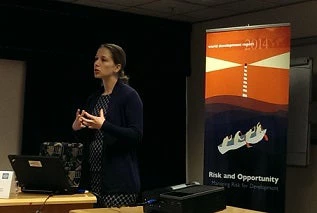Following the launch of the World Development Report (WDR) 2014, Risk and Opportunity: Managing Risk for Development, various team members have been traveling to different countries to present its findings. I recently joined other team members in a visit to Morocco, Egypt, Ethiopia, and South Africa, with a stop in the middle in London and Oxford.
One thing that struck me was how relevant the topic of risk management is for many countries. The importance of risk management seemed immediately apparent to many participants in our discussions. Indeed, many participants gave examples of risk management measures that have been practiced in their cultures for generations (such as storing grain in African villages), or linked messages in our Report to common sayings – for example, as Professor Awad from the American University in Cairo told us, our message on the importance of saving in good times for the bad times has a direct parallel in the old Arabic adage, “to keep a white coin for a black day”.

There were two aspects of the WDR 2014 that seemed to resonate with audiences, but whose resolution is more difficult to achieve. The first relates to the collective action needed to address global risks that have accompanied increased globalization, such as pandemics and climate change. Our messages on how to improve management of these risks – particularly through a multi-disciplinary approach that combines policy advice with technical expertise, and by taking actions forward where progress can be made, rather than waiting for all-encompassing global deals – resonated strongly with our host in Oxford’s (Ian Goldin at the Oxford Martin School) recent report, Now for the Long-Term: The Report of the Oxford Martin Commission for Future Generations.
The second relates to obstacles to risk management. The WDR 2014 argues that while attention is often given to risks and their related policies, insufficient attention is given to the obstacles that often impair risk management. For many audiences in Africa these obstacles were all too apparent – for example, participants in Egypt were particularly concerned with how corruption and political instability may prevent good risk management, while in South Africa there was a sense of strong legislation for risk management that is often not implemented well. Catherine Wijnberg (director of Fetola – an enterprise development program) told us that lack of trust between government and the private sector is a major obstacle to reducing unemployment in South Africa.
But how to overcome the many political economy issues – beyond lack of resources – which contribute to these obstacles? One thing that is needed, and is already happening, is a change in discourse about risk management. As our discussion with a number of Civil Society Organizations in London brought to the fore, people sympathize with victims of disasters – which helps raise funds for aid following disasters but makes it relatively more difficult to raise more funds in advance for disaster prevention and preparation. Tom Mitchell from the Overseas Development Institute told us that arguing that risk management is cost-effective often falls flat, because a dollar spent in advance of an uncertain event is very different from a dollar spent after a known event. However, I do think demonstrating that the costs of particular interventions outweigh the benefits can be an important line of argument. This has been effective for mobilizing increased support for vaccinations, for example, but has also been an important part of the debate in countries that have really improved their management of particular risks (such as droughts in Ethiopia, or locusts in Morocco).
Moreover, there needs to be much more emphasis on the argument that spending on risk management is not a competitor for growth-enhancing investments, but can itself be growth-enhancing, and is central to sustainable development. Many in the disaster risk community believe that agreement on a resilience measure as part of the post-MDG agenda is a challenging but important way to generate increased focus on this.
Finally, more attention needs to be given to institutions for risk management. We place a lot of emphasis in the WDR 2014 on the importance of increased knowledge of risks. Indeed, it is natural for risk management to begin with detailed risk assessments – as has happened in Morocco, and is now happening in Ethiopia. However, risk management requires movement beyond assessment to action. To meaningfully achieve this, especially for risks that evolve over long horizons, it may be necessary to create institutions (whether stand-alone bodies, or as part of the government executive) that combine a mandate and expertise to oversee risk management at a national level.


Join the Conversation